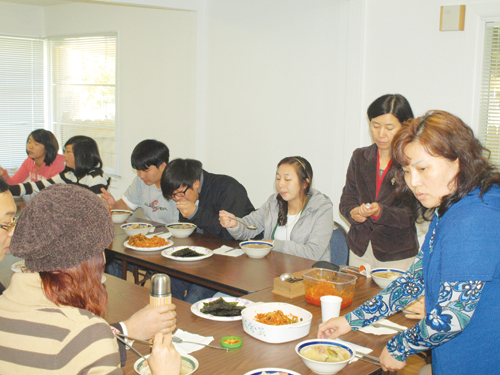By Steven Cong
Northwest Asian Weekly

Members of the International Mission Church sit down and share a meal together. (Photo by Steven Cong/NWAW)
The International Mission Church in Auburn and the Chinese Baptist Church on Beacon Hill have something in common: a devotion to Christianity.
However, they do contrast in age. The Auburn Church was founded last May, while the Beacon Hill church was founded in 1896 in Seattle’s International District. While the former consists mostly of Korean members, the latter consists of Chinese members. Members like Ming Lee of the Chinese Baptist Church, and the pastors and deacons of the International Mission Church, have found a haven in religion. They also want to share it with their communities.
“The Christianity that many are familiar with is not the same Christianity that people experienced right after Jesus died,” said Ming Lee, the youth pastor of the Chinese Baptist Church. “In America, it is heavily Westernized and carries traditions that are very disconnected from the cultures of East Asia and the actual Biblical account.”
The leaders of both churches professed that there is greater difficulty in relaying this religion to Asians due to cultural differences.
“The Western culture is almost the Christian culture,” said Sun Mi Pak, assistant pastor at the International Mission Church.
Michael Kim, son of the pastor at International Mission Church, said that it’s harder for Koreans than for Korean Americans to accept Christianity because it’s not as culturally integrated despite early visitations by Western missionaries. However, he does add that it’s generally easier for Koreans to accept Christianity than for many other Asians because Koreans have had a history of monotheism in the worship of the god Dan Gun.
Lee’s response concerning the Chinese is slightly different. He notes that the Chinese are so culturally diverse and have so many different dialects that the Chinese community’s receptiveness to Christianity varies, depending on the individual.
Both churches stressed the complications of preaching to different generations of Asians. Second or third generation Chinese or Koreans have significantly different perspectives from the first generation. However, despite the challenges, both churches believe that their respective communities are willing to overcome the obstacles of attaining this faith.
“We don’t focus on the Western traits of American Christianity, and we just try to keep it Biblical,” said Lee.
He adds the Christian culture and that of the Chinese share common themes in that the church incorporates differences to bridge the gap. An example he shared was from Second Corinthians, Chapter Eight, where the Biblical text addresses the issue of eating food being offered to idols, which exhibits commonalities with Chinese values in terms of familial duties.
“Christianity is a window into Western culture for Koreans,” said Pak. The example she used was how Christmas is truly celebrated for Christ’s birthday — as opposed to being just another gathering — following one’s conversion to Christianity.
Lee agrees with this newfound understanding of Western norms, but is not so sure of its culture. He sees the Chinese community adapting Christianity to the indigenous culture as opposed to adopting its Western traditions.
“Koreans still honor ancestors on certain days, but would pray for them instead of bowing,” said Kim, sharing a sentiment that is in conjunction with that of Ming’s.
Whatever role Christianity plays culturally, both Asian churches are optimistic about the role it would play in the Asian community.
“One of the members of the church, a deaconess, has been feeding the poor every single Saturday for about eight years,” said Deacon Joey Pak of the International Mission Church.
“With continued immigration from China, the Asian American community is a huge mission field for sharing the story of Jesus,” said Lee. He also cites the Kin-On Health Care Center as a charity that Asian Christians had helped to support in the Greater Seattle Area.
“I am changing more and more after I found this faith,” says Deacon Sarah No of the International Mission Church, describing a personal benefit she received after becoming a Christian.
Both groups seem to believe that this is an adaptable religion for everyone, especially given how the International Mission Church’s mission statement is to provide “a church where anyone can get together and worship God.” ♦
For more information, e-mail Michael Kim of the International Mission Church at michaelkim87@yahoo.com, or Pastor Ming Lee of the Chinese Baptist Church at mlee@seattlecbc.org.
Steven Cong can be reached at info@nwasianweekly.com.



